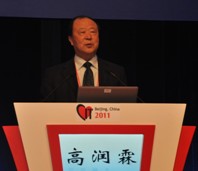[CIT2011]面对变化,通力合作——大会主席高润霖和共同主席Martin B. Leon开幕式致辞
The 11th China Interventional Therapeutics (CIT) meeting officially opened yesterday bringing together a growing attendance and some the world’s most authoritative figures in the world of interventional cardiology united by the aim in improving clinical outcomes

The 11th China Interventional Therapeutics (CIT) meeting officially opened yesterday bringing together a growing attendance and some the world’s most authoritative figures in the world of interventional cardiology united by the aim in improving clinical outcomes: the theme of this year’s meeting. Prof Run Lin Gao President of CIT welcomed to attending delegates, paid tribute to the distinguished panel present and highlighted the importance of the need for growing cooperation in the face of change which will form the basis of the keynote speech by Prof Martin Leon of Columbia University of New York and founder of TCT. Prof Gao also spoke of the growing importance and recognition of CIT in the world of interventional cardiology which since it’s inception from 2003 from peripheral beginnings with less than 1000 attendees to 2011 where it is estimated nearly 5000 attendees will attend this year’s meeting. This makes CIT the 3rd largest interventional cardiology meeting in the world. This year’s meeting will include 950 lectures, 17 late breaking trials, plenary sessions and live international case studies including from the renowned New York-Presbyterian Hospital of Columbia University. The opening ceremony also recognized the work and leadership of the two presidents of the largest interventional cardiology meetings in the world Prof Jean Marco President of PCR of Europe and Prof Martin Leon President of TCT of the United States. Both presidents congratulated Prof Gao for the growing success of CIT which has grown in line with the economic development of China.
This according to Prof Martin Leon will put the emphasis on developing economic powers such as China in leading innovation, education and research in the future which formed a major part of his Keynote speech entitled: The Heritage of Interventional Cardiology: past accomplishments and future opportunities. Prof Leon provided a detailed overview and painful development of the various interventional procedures of the past 60 years which during the early years were blighted with high failure rate and highly invasive protocols. Using this period of the 50s till the early 90s procedures were initiated according to word of mouth and prior experience but without large scale randomized controlled trials we see in today’s evidence based medical practice. This referred by Prof Leon as the age of empiricism which provided the foundation for the motivation of improving and searching alternative procedures with evidence of improved outcomes. This provided the platform for the growing popularity and now routine use of stents for the treatment of clogged arteries. This was facilitated by evidence based backing from evidence based trials. From this period on marked the birth of a new era where innovation and development drastically improved patient outcomes. However, according to Prof Leon the world of interventional cardiology has now reached a critical juncture which requires a collective effort to facilitate a smooth transition. This from the current problematic situation where the costs and logistics of developing new therapies have resulted in many new exciting potential therapies taking too long to reach clinical practice. He concluded that the interventional community must look towards developing economic powers such as China and India which he foresees a much increased role in bridging this distance in the way of research, development and economic muscle. In addition he finished on a theme which he hoped will be carried on into the future in that we all must combine all aspects cardiovascular disease to create more reliable data from well designed clinical trials which will not only speed up the translation process from findings towards application but also in educating physicians in a collective effort in improving patient outcomes.



 京公网安备 11010502033353号
京公网安备 11010502033353号